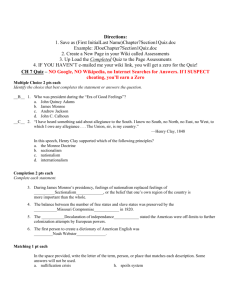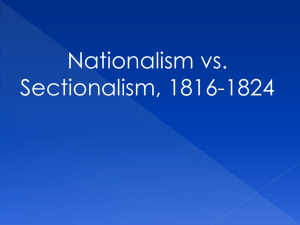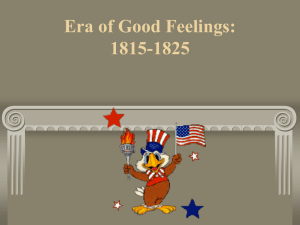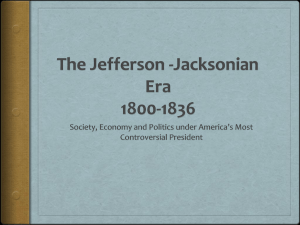The Era of Good Feelings Introduction: Following the War of 1812
advertisement
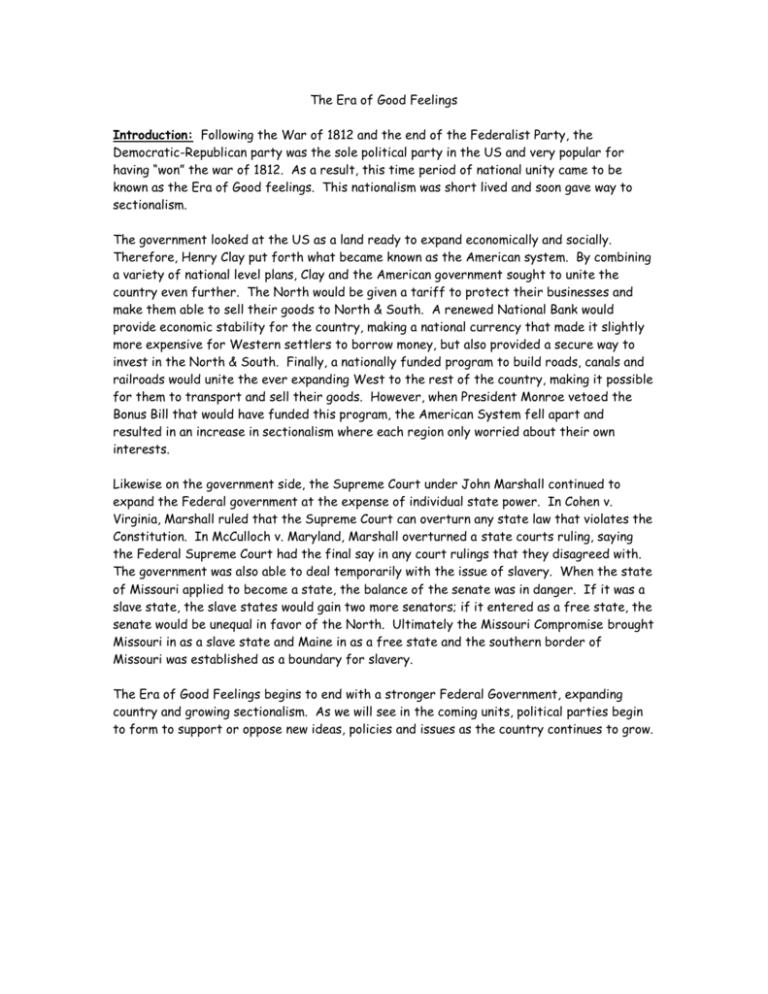
The Era of Good Feelings Introduction: Following the War of 1812 and the end of the Federalist Party, the Democratic-Republican party was the sole political party in the US and very popular for having “won” the war of 1812. As a result, this time period of national unity came to be known as the Era of Good feelings. This nationalism was short lived and soon gave way to sectionalism. The government looked at the US as a land ready to expand economically and socially. Therefore, Henry Clay put forth what became known as the American system. By combining a variety of national level plans, Clay and the American government sought to unite the country even further. The North would be given a tariff to protect their businesses and make them able to sell their goods to North & South. A renewed National Bank would provide economic stability for the country, making a national currency that made it slightly more expensive for Western settlers to borrow money, but also provided a secure way to invest in the North & South. Finally, a nationally funded program to build roads, canals and railroads would unite the ever expanding West to the rest of the country, making it possible for them to transport and sell their goods. However, when President Monroe vetoed the Bonus Bill that would have funded this program, the American System fell apart and resulted in an increase in sectionalism where each region only worried about their own interests. Likewise on the government side, the Supreme Court under John Marshall continued to expand the Federal government at the expense of individual state power. In Cohen v. Virginia, Marshall ruled that the Supreme Court can overturn any state law that violates the Constitution. In McCulloch v. Maryland, Marshall overturned a state courts ruling, saying the Federal Supreme Court had the final say in any court rulings that they disagreed with. The government was also able to deal temporarily with the issue of slavery. When the state of Missouri applied to become a state, the balance of the senate was in danger. If it was a slave state, the slave states would gain two more senators; if it entered as a free state, the senate would be unequal in favor of the North. Ultimately the Missouri Compromise brought Missouri in as a slave state and Maine in as a free state and the southern border of Missouri was established as a boundary for slavery. The Era of Good Feelings begins to end with a stronger Federal Government, expanding country and growing sectionalism. As we will see in the coming units, political parties begin to form to support or oppose new ideas, policies and issues as the country continues to grow. Key Terms/Key Figures You should be able to define, explain, and apply the following terms as necessary: American System Henry Clay James Monroe Era of Good Feelings Marbury v. Madison American System Tariff of 1816 National Bank Cohens v. Virginia McCulloch v. Maryland Monroe Doctrine Missouri Compromise 36-30 Line Key Facts Era of Good feelings is due to the idea that only one political party (DemocraticRepublicans) and would avoid political fights The American System will unite the country economically, socially and politically but fails to organize support of the President Sectionalism starts to divide the West, North and South Missouri applies for state hood and displays more sectionalism in a pending fight to win the Senate Missouri Compromise provides solution that preserves the balance in the Senate and attempts to stop the spread of slavery Monroe Doctrine tells Europe to stay out of the Western hemisphere and asserts American power…hidden behind the shield of the Pacific and Atlantic oceans The Supreme Court continues to expand power in variety of decisions that reduces the power of the States Key Themes What was the American System? How would it unite the country? How did it fail? Explain the Missouri Compromise and why this was a temporary solution Explain the Monroe Doctrine and the audience it was intended for
